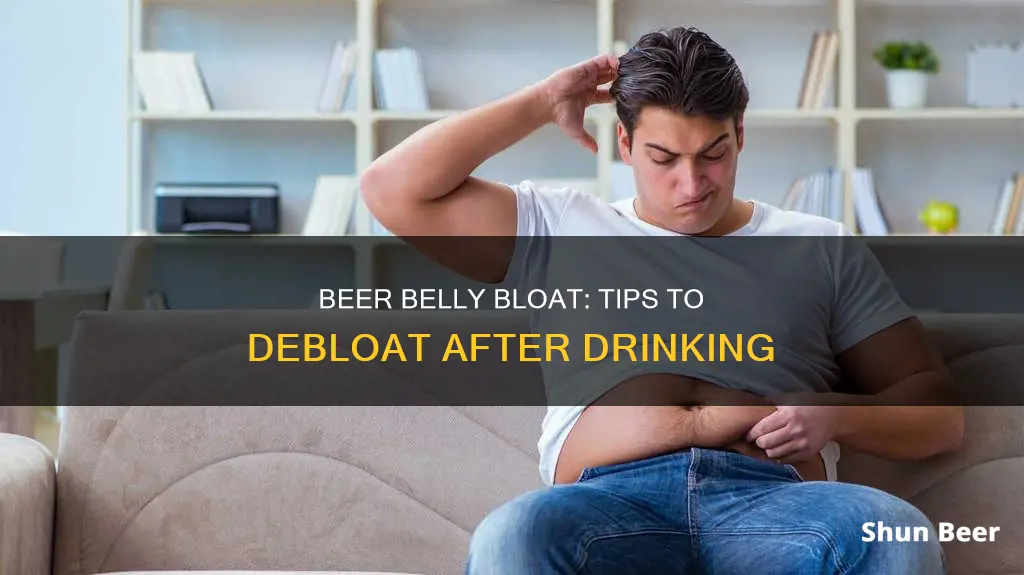
Alcohol bloating is a common side effect of drinking beer, wine, or other alcoholic beverages. It occurs due to several factors, including the dehydrating nature of alcohol, increased gas production, and the high sugar and calorie content of alcoholic drinks. The bloating can cause discomfort and be aesthetically unpleasant, but it can also indicate more severe health issues. This article will discuss the causes of alcohol bloating and provide tips to prevent and alleviate the bloated feeling.
| Characteristics | Values |
|---|---|
| Cause of bloating | Alcohol irritates the stomach lining and the digestive tract, causing inflammation and pain in the abdomen. |
| Dehydration | Alcohol is a diuretic, causing the body to lose water and leading to dehydration. This results in water retention and bloating. |
| Gas production | Alcohol increases gas production in the gut, leading to bloating and discomfort. |
| Calories and weight gain | Alcoholic drinks are high in calories, contributing to weight gain around the abdomen, which can feel like bloating. |
| Inflammation | Alcohol can cause inflammation in the stomach and intestines, exacerbating bloating and swelling. |
| Sugar and carbonation | Sugary and carbonated drinks, as well as beer, increase gas production and bloating. |
| Solutions | Drink water, choose non-bloating alcoholic beverages, consume probiotics and digestive enzymes, exercise, avoid gas-producing foods, choose high-potassium foods, reduce air swallowing, avoid smoking, and eat smaller meals. |
What You'll Learn

Drink water before, during, and after drinking alcohol
Drinking water before, during, and after drinking alcohol is one of the most effective ways to prevent alcohol bloating. Alcohol is a diuretic, which means it increases urine production and causes the body to lose water, leading to dehydration. This, in turn, causes the body to retain water, resulting in swelling or puffiness in the face, stomach, or limbs.
Drinking water helps to counteract the dehydrating effects of alcohol and prevent fluid retention. It is recommended that women drink approximately 2.7 litres of water per day, while men should aim for 3.7 litres. When consuming alcohol, it is even more important to increase water intake. By making sure there is enough water available, the body will not need to pull water from other tissues, reducing the risk of bloating.
Drinking water also helps to support digestion, which is slowed down by alcohol-induced dehydration. Sipping water throughout the day and evening will keep you hydrated, reduce inflammation, and prevent constipation and excess gas, all of which can contribute to bloating.
In addition to drinking water, it is also beneficial to eat a balanced meal before drinking. This helps to slow down the absorption of alcohol and reduce the risk of bloating and other digestive issues.
Beer Beyond Best Before: Is It Safe to Drink?
You may want to see also

Avoid carbonated and sugary drinks
Alcoholic drinks are often carbonated and contain a lot of sugar, both of which contribute to bloating. Carbonated drinks, such as beer, prosecco, champagne, and carbonated mixers, introduce excess gas into the body, which leads to bloating. The fermentation process in beer can also produce gas in the digestive system, causing discomfort and a feeling of fullness.
Sugar, meanwhile, is present in large quantities in many alcoholic drinks, including beer, wine, mixed drinks, and carbonated sodas. This high sugar content can lead to bloating and other uncomfortable feelings in the gut. The sweeter the wine, the higher the sugar content and the more likely it is to cause bloating.
To avoid bloating, it is best to stay away from carbonated and sugary drinks. Opt for non-fizzy mixers with your spirits, and choose natural juices or flavoured water instead of mixed drinks with sugary ingredients. Light beers and low-alcohol spirits are also better options, as they have fewer calories and carbohydrates.
In addition to avoiding carbonated and sugary drinks, drinking plenty of water can help to reduce bloating. Water will help to rehydrate the body, reduce inflammation, and prevent constipation and excess gas. Staying hydrated is especially important when consuming alcohol, as it is a diuretic and can lead to dehydration.
Exercising is another way to reduce bloating, as it encourages food to pass quickly through the digestive tract. Even a simple walk can help to get rid of alcohol-induced bloating.
Beer and Muscle Relaxers: Safe Mix?
You may want to see also

Eat a balanced meal before drinking alcohol
Eating a balanced meal before drinking alcohol can be an effective way to prevent alcohol-related bloating. This is because food in your stomach slows down the absorption of alcohol into your bloodstream.
When you drink on an empty stomach, the alcohol is absorbed more quickly, increasing the risk of bloating and digestive issues. Eating a balanced meal before drinking can help to slow this process, giving your body more time to process the alcohol and reducing the risk of uncomfortable side effects.
It's important to choose the right kind of meal. Fatty foods, for example, can increase the risk of bloating. Opt for a meal that includes foods rich in potassium, such as bananas, avocados, spinach, and broccoli. These foods will help to replace lost fluids and reduce bloating.
In addition, make sure you stay hydrated by drinking water before, during, and after consuming alcohol. This will help to counteract the dehydrating effects of alcohol, which can contribute to bloating.
While eating a balanced meal before drinking alcohol can be helpful, it's important to remember that the best way to prevent alcohol-related bloating is to moderate your alcohol consumption. Reducing the amount of alcohol you drink will lower the risk of bloating and other negative health consequences.
Beer and Weight Gain: What's the Connection?
You may want to see also

Take antacids or proton pump inhibitors
Alcohol bloating is a common issue, and while reducing alcohol consumption is the best way to prevent it, there are other ways to manage the discomfort. One way to tackle bloating is to take antacids or proton pump inhibitors (PPIs).
Antacids are over-the-counter medications that can help settle the stomach by reducing the harm caused by stomach acid. Alcohol can irritate the stomach lining and increase acid levels, leading to inflammation and pain. Antacids such as Alka-Seltzer, Rolaids, and simethicone can provide relief from these symptoms. They work by neutralising the excess stomach acid, which in turn reduces inflammation and irritation in the stomach and intestines. This can help alleviate the bloating sensation and any associated discomfort.
Proton pump inhibitors (PPIs) are another type of medication that can be used to manage alcohol-induced bloating. PPIs, such as Protonix and Nexium, work by reducing the production of stomach acid. They do this by blocking the action of the proton pumps in the stomach, which are responsible for producing acid. By reducing the amount of acid produced, PPIs can help alleviate the symptoms of gastritis, an inflammatory condition caused by alcohol that affects the stomach lining. It's important to note that PPIs are usually prescribed by a doctor, especially for long-term use, as they can have side effects.
While antacids and PPIs can provide relief from alcohol-induced bloating, it's important to remember that they don't address the root cause of the problem, which is excessive alcohol consumption. To effectively prevent bloating, it's recommended to reduce alcohol intake, stay hydrated, and make healthier choices when drinking, such as avoiding carbonated and sugary drinks.
In addition to antacids and PPIs, there are other over-the-counter medications that can help with alcohol bloating, including H2 blockers, which work by decreasing stomach acid production.
Avoid Skunky Beer: Keep Your Beer Fresh and Tasty
You may want to see also

Exercise to get your body moving and boost your metabolism
While exercise is not a cure for bloating, it can certainly help to reduce puffiness and discomfort. Getting your body moving is always a good idea, and there are some specific exercises that can help with bloating.
Cardio exercises are a great way tosection=””> expel gas and get things moving in your digestive system. A nice long walk, a jog, a bike ride, or even a session on the elliptical can all help to deflate your bloat. Aim for 30 minutes of mild to moderate exertion to help ease the pain and discomfort of bloating.
Yoga is another excellent workout for bloating, as it increases blood flow and circulation, helping to get things moving again. Try the Cat-Cow pose to stretch and compress your intestines and promote movement. Start on all fours with your hands directly under your shoulders and your knees directly under your hips. Keep your spine and neck neutral. Exhale and push your spine toward the ceiling, allowing your back to round and your head to fall toward the floor. Hold for 10 seconds. Then, let your stomach fall toward the floor and arch your back the opposite way, bringing your shoulders together and keeping your neck neutral. Hold for another 10 seconds. Repeat this cycle three times for a total of one minute.
The Torso Twist is another effective yoga pose for bloating. Sit on a mat with your legs extended and your arms at your sides. Bend your knees and bring them up toward your chest, balancing on your tailbone. Bend your elbows and bring your arms in front of your chest, with your palms touching. Keep your core engaged and your back and neck straight, then rotate your upper body to the left until your right elbow crosses your knees. Return to the middle and repeat on the right side. Aim for 2-3 sets of 10 reps.
In addition to cardio and yoga, other gentle activities like swimming or low-impact cardio can also help to reduce bloating. It's important to avoid high-intensity exercises, as these may make you feel worse. Remember, the key to managing bloating is to stay active, eat enough fibre, and drink plenty of water.
Beer League Hockey: Is It Just About Beer?
You may want to see also
Frequently asked questions
Drink plenty of water before, during, and after drinking alcohol to counteract dehydration and prevent fluid retention.
Eat a balanced meal before drinking to slow down the absorption of alcohol and reduce the risk of bloating and other digestive issues.
Yes, avoid carbonated and sugary drinks, as these can increase gas production and bloating.
Salty and fatty foods can make bloating worse. Instead, opt for high-potassium foods like bananas, avocados, spinach, and broccoli.
Taking a probiotic supplement can support your digestive system and help to reduce bloating.







